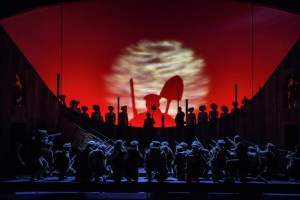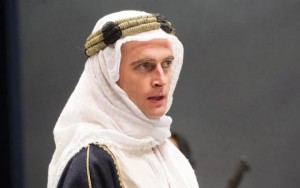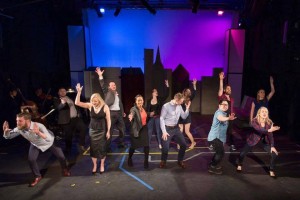Spectacles: An Evening with Sue Perkins
At The Hexagon, Reading
20th September, 2016
 Spectacles: An Evening with Sue Perkins
Spectacles: An Evening with Sue Perkins
At The Hexagon, Reading
20th September, 2016
 9 to 5: The Musical, music and lyrics by Dolly Parton based on the book by Patricia Resnick
9 to 5: The Musical, music and lyrics by Dolly Parton based on the book by Patricia Resnick
Performed by Centre Stage at The Bridewell Theatre
22nd July, 2016
‘Tumble out of bed and stumble to the kitchen, pour myself a cup of ambition and yawn and stretch and try to come to life.’
‘9 to 5:The Musical’ is the hilarious musical comedy based on the hit 1980s film that centres on three office workers who turn the tables on their sexist boss. Whilst Dolly Parton isn’t in the show in person, her presence is clearly felt throughout the show, and certainly, she has a knack for good old-fashioned country story-telling, even if the premise is implausible.
This is a fast moving, infectious production that centres around three beleaguered secretaries Violet (Claire Linney), Judy (Gemma Zifras) and Doralee (Camilla Burnside). The three quirky characters find sisterhood in taking on ‘egotistical, hypocritical bigoted’ boss from hell, Franklin Hart Jnr (Luke Leahy) with unexpected consequences which really goes to show that 1980s ‘girl power’ can triumph over evil.
While the entire ensemble is exceptional, a number of performances stand out. One of the strongest performances comes from Luke Leahy, who succeeds in the unenviable task of playing the villain of the show with bigoted brilliance, whilst virtually stealing every scene he is in. ‘You are nothing but a typewriter with tits’ he tells Doralee, which makes his comeuppance all the more sweet.
Claire Linney shines as the downtrodden, Violet, long-overdue a promotion and leader of the trio, who hold their misogynist manager hostage. Wry and ambitious, Linney’s Violet holds the show together and enjoys a touchingly low-key romance with a colleague. Her solo number, ‘One of the Boys’ is feisty; definitely something every woman in the audience wanted to get up and sing. Continue reading 9-5: The Musical
‘De Profundis’ a one-act, one-man musical written by Paul Dale-Vickers with additional lyrics by Alastair Brookshaw.
At Gillygate Shed, York.
20th July, 2016.
‘The love that dare not speak its name’
‘I became a spendthrift of my genius and to waste an eternal youth gave me a curious joy’.
‘De Profundis’ is a powerful dramatisation of the 50,000-word letter Oscar Wilde wrote to his long-term lover, Lord Alfred Douglas (Bosie) from his prison cell in Reading Jail in 1897. The title translates from Latin as ‘from the depths.’ Two years previously, Wilde had been imprisoned for acts of gross indecency with other males. The letter is a conceit of Wilde’s way of rationalising his suffering. It is petulant and at first massively arrogant and self-pitying – a mixture of Wilde rants against Douglas for his cruelty and indifference and the hatred for his father. So we are taken on a journey of the pressures from Bosie’s influential family and from the homophobic state.
The letter captures Wilde’s early months of imprisonment when his mother died. ‘Her death was terrible to me,’ he laments; ‘but I, once a lord of language, have no words with which to express my anguish and my shame’.
From the start, De Profundis , Paul Dale-Vickers’s talented tenor voice draws the audience into Wilde’s maelstrom of emotions. His haunting voice and bruised self demands your attention. As Paul says, he allows the rhythm of the words dictate the shape of the music and allowed the sentiment to drive the chords and melodies. ‘Much of the lyrical content is taken directly from the letter, with some invention required to tie ideas together.’
 ‘In Parenthesis’ by Iain Bell. Libretto by David Antrobus and Emma Jenkins,
‘In Parenthesis’ by Iain Bell. Libretto by David Antrobus and Emma Jenkins,
At The Royal Opera House
29th June, 2016
‘The enemy front-fighters who we shared our pains against whom we found ourselves by misadventure’
Unknown to me, David Jones was a London Welsh poet who fought in the First World War with the 38th Division of the 18th Royal Welch Fusiliers, returning with shell-shock to write an epic poem in prose and verse, In Parenthesis; the parentheses being the brackets around the years 1914-1918. The opera was launched to coincide with the 100th anniversary of the Battle of Mametz Wood which took place on 11-17 July 1916, and at which Jones’s battalion alone lost 263 men. 2016 is something of a significant year for the Welsh National Opera. They are celebrating their 70th anniversary, continuing to produce extraordinary and successful productions year after year, even as the popularity of opera fluctuates. Sadly, the problem with the production is the source material. It does not translate easily into opera, not least because it barely has any plot.
In light of all the plaudits for this production, there is little I find satisfying. Perhaps, this is because the opera doesn’t spend enough time with any one character to make them come entirely alive. It may also account for the two parallel worlds in the work: the real world of life as an infantryman on the front line and a world where Arthurian knights seek the Holy Grail.
Interwoven with scenes of the trenches are otherworldly occurrences, together with the presence of two actors playing the Bards of Britannia and Germania, characters that would seem more at home in a staging of ‘A Midsummer Night’s Dream’ than on a World War One Battlefield. By the end of the opera, it subsumes the temporal world so that these soldiers have completely become one with their ancestor warriors of the past. They’ve become legends in their own right. Continue reading In Parenthesis
 ‘My Mother Said I Never Should’ by Charlotte Keatley
‘My Mother Said I Never Should’ by Charlotte Keatley
At the St James’s Theatre
7th May, 2016
‘You hate dead things, not old things’
It is important to remember that in 1987, plays by female writers were rare. Nevertheless, ‘My Mother Said I Never Should’ is a strange play, with the writer, Charlotte Keatley placing herself somewhere in between social realism and the surrealism of Caryl Churchill. It is typical of its time in that this story of four generations of women in one family (from the 1940s to the 1980s) not only explores the theme of mothers and daughters, but challenges the audience with different theatrical forms. The play addresses the issues of teenage pregnancy, career prioritisation and single motherhood. It is also explores how the different generations break free from parent traditions and culture.
Very simply, Doris, born in 1900 to an unmarried mother, is instilled with a sense of dutiful subservience and self-sacrifice. Her only daughter, Margaret inherits some of those values but is freer to build a career of her own, Margaret’s daughter, Jackie, takes liberation a stage further, but, after an unplanned pregnancy in 1969, she hands her baby daughter, Rosie, to her mother to bring up as her own.
 ‘Right Now’ by Catherine- Anne Toupin, produced in association with Traverse Theatre Company at the Bush Theatre
‘Right Now’ by Catherine- Anne Toupin, produced in association with Traverse Theatre Company at the Bush Theatre
11th April, 2016
When people are left alone, that’s when bad things happen’.
‘Right Now’ by the French Canadian actress/writer Catherine-Anne Toupin should be a destabilising, yet rewarding 80 minutes. Instead, it left me disappointed. The play has echoes of the discomforting relationships in Ian McEwan’s The Comfort of Strangers and Joe Orton’s ‘Entertaining Mr Sloane.’ But the opportunity is lost to create a psychologically, intriguing dark comedy.
We are introduced to bright young couple Alice and Ben, who have just settled into a beautiful new apartment. Their lives are invaded by the pushy neighbours from across the hall. Juliette (Maureen Beattie), Gilles (Guy Williams), and their son François (Dyfan Dwyfor) are unfazed by social convention, and they insinuate their way into the living space and life of Alice and her affable, then cruelly indifferent husband Ben (Sean Biggerstaff). The neighbours break social taboos from inviting themselves to dinner to boldly stating that they don’t love their own son. Outwardly Juliette and Gilles show a complete lack of desire for each other whilst flirting outrageously with their young hosts. Things begin to heat up as innocent invitations lead to passionate encounters and unsettling revelations – A very sinister relationship quintet. Reality and fantasy start to bleed together seamlessly that we don’t know where one stops and the other starts.
25th March, 2016
‘Nothing prepares you for how f***ing fierce it is’
It’s 22nd July 2016 when a BU21 aircraft, coming from New York, gets hit by a surface-to-air missile in a suspected terrorist attack, before crashing into Parsons Green, a residential area in south London. Stuart Slade’s play explores how six young Londoners will cope with the aftermath after being differently involved. How would each and every one of us deal with such a horror? We all now live under the daily shadow of suicide bombs, mass shootings, genocides, drone strikes, school massacres and there is a resulting trauma and emotional wreckage. The conceit of a survivors’ group is a way of incorporating the words of ‘real’ people, as spoken in private interview or public record, into a riveting verbatim drama.
The Survivors’ group is composed of six interwoven monologues. Each person alternates their position centre stage when it is their turn to share their painful memories through a spontaneous stream of consciousness which at times becomes a theatrical joyride of humour and darkest feelings or deepest thoughts. Each survivor’s tales unfolds piecemeal over the course of the play. Gradually the audience comes to know more about the ramifications of the attack, and the deep psychological scars left on all of the characters.
Yet, there is no political correctness here. Stuart Slade’s intelligent writing is blunt and bleakly observed and the cast deliver with immediacy, such grim topicality.
 Lawrence after Arabia by Howard Brenton
Lawrence after Arabia by Howard Brenton
At the Hampstead Theatre
26th May, 2016
‘It has to have been real. Because of the pain.’
‘Lawrence after Arabia’ is the latest in Brenton’s sequence of history plays whose subjects have ranged from St Paul to Anne Boleyn and Oliver Cromwell to Harold Macmillan. Set in 1923 and mostly taking place in the Hertfordshire home of the Bernard Shaw, a haunted T. E. Lawrence, unsettled by his fame and desperate for anonymity, has just joined the RAF under an assumed name. When the news breaks, it causes a scandal for the British establishment. ‘You can’t have an officer and a gentlemen cleaning lavatories,’ is the rebuff from William Chubb’s stiff-upper- lipped,Field Marshall Allenby – Lawrence’s former commander. At the same time, Lawrence is obsessed with the telling of his story, editing and rewriting ‘The Seven Pillars of Wisdom’ with the help of Shaw’s wife Charlotte (Geraldine James).
 ‘I Love You, You’re Perfect, Now Change’
‘I Love You, You’re Perfect, Now Change’
At the Bridewell Theatre
11th March, 2016
‘And the Lord God said, ‘Let there be light’, and there was light. And the Lord God said, ‘Let There Be Man and Woman’ and there was man and woman. And that night man asked woman if she was busy.’
Here I go again. Musicals are a genre I love to hate, or sometimes hate to love. I had to be in the mood for one and this time I was, since I had heard such praise of the Sedos who claim to be the premier amateur musical theatre group in London- a worthy accolade.
With music by Jimmy Roberts and a book and lyrics by Joe DiPietro, ‘I Love You, You’re Perfect, Now Change’ is a series of scenes on everything you have ever secretly thought about dating, romance, marriage, lovers, husbands, wives and in-laws, but were afraid to admit. Effectively, the musical is a celebration of the mating rituals, of truths and myths in building relationships. The cast have worked creatively to update the script. Admittedly, the material offers nothing particularly original; it largely relies on stereotypes to drive home the point, but it’s good-natured and relatable, genuinely funny in parts and, unexpectedly, touching in others.
 Fear and Misery (Furcht und Elend des Dritten Reiches), also known as The Private Life of the Master Race by Bertolt Brecht
Fear and Misery (Furcht und Elend des Dritten Reiches), also known as The Private Life of the Master Race by Bertolt Brecht
At the Union Theatre, London Bridge
25th January, 2016
‘Whenever there are human beings, there is fraility’
Written when he was in exile in Denmark, Bertolt Brecht’s openly anti-Nazi play, ‘Fear and Misery of the Third Reich’ is set in 1930s Germany. Phil Wilmott’s clever production is chillingly relevant today. The backdrop serves both as a window and mirror to create the illusion of reflection, transparency and coercion – we are looking at lives through a distorting political prism.
Through a series of sharp vignettes, Brecht creates a picture of suspicion and anxiety experienced by ordinary people in National Socialist Germany of the 1930s, particularly Jewish citizens, as the power of Hitler grew. Wilmott exploits the episodic approach which is held together by an undercurrent of fear. For example, in Berlin in 1933, a storm trooper eggs on a worker to make jokes about the regime and shows him the trick of marking a suspect with a chalk cross on the back of his jacket, unawares. There are charged moments such as Tori Louis’s woman suddenly saying the wrong thing to a radio interviewer or realising what she has had done after accusing a neighbour that give an instant image of vulnerability.